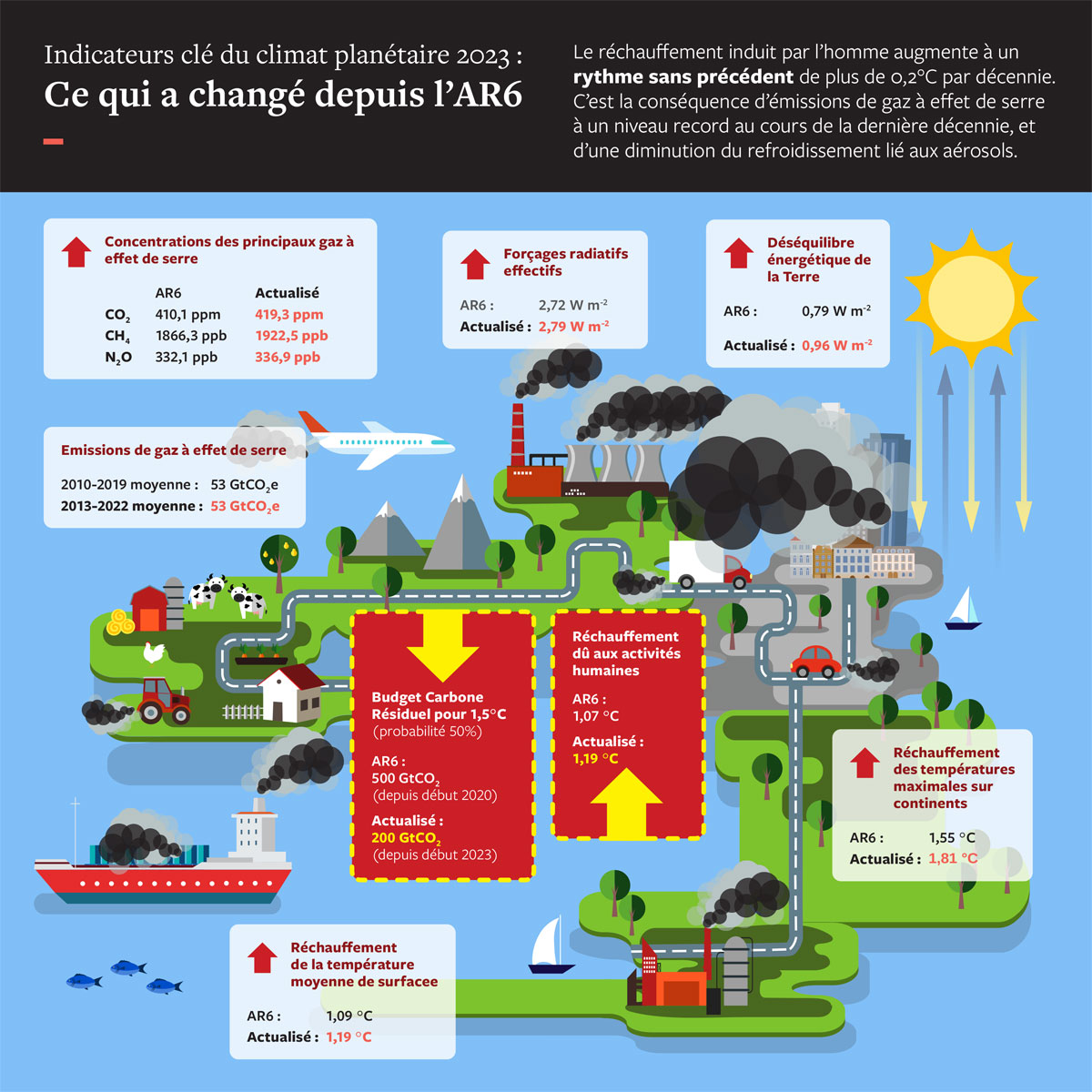Follow us on Google News (click on ☆)

As 2023 ranks as the hottest year on record, a group of 50 international scientists including Valérie Masson-Delmotte, Sophie Szopa, Aurélien Ribes, Karina von Schuckmann, and Pierre Friedlingstein, from several French organizations (CEA, CNRS, Mercator Océan international, Météo-France, IPSL-ENS, Paris Saclay) have published their second annual report on global climate change indicators in the scientific journal Earth System Science Data.
Once again this year, the study's conclusions reveal that warming due to human activities continues to increase, reaching 1.19°C over the last decade (2014-2023) compared to the pre-industrial period, surpassing the 1.14°C estimated between 2013 and 2022 (as indicated in last year's report).
The analysis also shows that the residual carbon budget, i.e., the amount of carbon dioxide that can be emitted before causing global warming of 1.5°C, is now only about 200 billion tonnes (approximately 220 billion tons), equivalent to five years of current emissions. In 2023 alone, human-induced warming reached 1.3°C.
This figure is lower than the overall warming observed during the same year (1.43°C), demonstrating that natural climate variability, particularly the El Niño phenomenon, also played a role in the record temperature of 2023.

Key planetary climate indicators 2023 © CEA, CNRM, Météo France, CNRS.
This report also presents new information on the effects of reducing sulfur emissions, particularly those from the global maritime transport industry. These emissions have a cooling effect on the climate by directly reflecting sunlight back into space and promoting the formation of more reflective clouds. The continued decrease in these emissions has reduced this effect. Although this phenomenon was offset last year by particle emissions due to wildfires in Canada, the cooling induced by particle emissions will continue to decline in the long term, the report's authors highlight.
"A rapid reduction in greenhouse gas emissions, 70% of which are caused by fossil fuel combustion (oil, natural gas, and coal), will limit the level of global warming we will eventually experience. At the same time, we need to build more resilient societies. The devastation caused by wildfires, drought, floods, and heatwaves that the world experienced in 2023 must not become a new norm," says Professor Piers Forster, director of the Priestley Centre for Climate Futures at the University of Leeds (UK) and coordinator of the study.
Another key finding: high levels of greenhouse gas (GHG) emissions also affect Earth's energy balance: ocean buoys and satellites are tracking unprecedented heat fluxes in the oceans, ice sheets, soils, and Earth's atmosphere. This heat flux is 50% higher than its long-term average.
"This second annual update after the 6th IPCC report highlights the intensification of human influence on the climate, with an even faster rate of heat accumulation due to human activities, and breaks down how temporary modulation by natural climate variability (particularly El Niño), in addition to human-induced warming, led to the record planetary temperature observed in 2023. The severity of the effects observed this year (which are not addressed in our article), related to extreme heat on land and at sea, extreme precipitation, drought, and wildfires, on ecosystems, populations, infrastructures, and the economy, sadly shows clearly why every increment of additional warming matters." declares Valérie Masson-Delmottte, climatologist at CEA.
The conclusions of this report should inform and guide the strengthening of climate action plans that all countries around the world have committed to present to the United Nations Framework Convention on Climate Change (UNFCCC) by 2025, in order to reduce emissions and adapt to the effects of climate change.